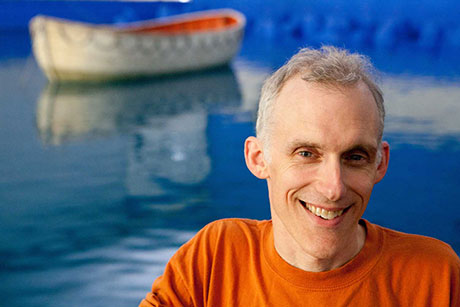Charter Day panelist preview: film editor Tim Squyres '81
By Sue Brightly
Register for Charter Day events
Charter Day: A Festival of Ideas and Imagination, part of Cornell’s sesquicentennial celebration, runs April 24-27. For event details and registration visit 150.cornell.edu/charterday.
Academy-award nominated film editor Tim Squyres ’81 (“Crouching Tiger, Hidden Dragon” “Unbroken,” “Syriana”) will speak at Charter Day: A Festival of Ideas and Imagination. His panel, “Sights and Sounds: Cornell Filmmakers and Visions for the 21st Century,” will be April 25, 3-4:30 p.m. at Cornell Cinema. His brother, Steve Squyres ’78, the James A. Weeks Professor of Physical Sciences and principal science investigator for the Mars Exploration Rover mission, will present “Cornell and the Joy of Discovery: Any Person, Any Planet” April 24 at 6 p.m.
You and your brother both attended Cornell.
And a sister – it turned into a family tradition. Steve’s the oldest; I was three years behind. I went to Cornell because I was interested in astronomy, and Cornell was the best astronomy school in the east. At the time, Steve was a geologist. He wasn’t thinking astronomy. And in fact, he’s still a geologist; it’s just that the rocks that he studies are not on Earth.

What made you change studies? Filmmaking is a pretty big departure from astronomy.
I was always spending time with the artsy people. And at some point I thought, hmm, maybe I should rethink what I’m doing. And then I took an introductory film class, and as soon as I did that, I knew right away what I should be doing.
At Cornell in the early ’80s, we were very limited in equipment and the kinds of films we could make. But that kind of forced you to be creative. [Film producer] Scott Ferguson ’82, who is on the panel, was one of my classmates.
Did your scientific background have anything to do with getting into editing?
The scientific method is very helpful in editing as a way of approaching a problem – how to break it down into parts and analyze it and find out what works and what doesn’t. Especially with the next film I’m working on, we’ve been making big technological leaps – going places where people haven’t gone before. And understanding things like 3-D and high frame rates and how those work both practically and psychologically – I think the scientific background has been very helpful.
And yet, film editing requires so much more than mastery of technology.
Being able to run the machines is one thing, but to tell good stories you have to have interesting stories to tell. And being grounded in all kinds of things besides a specific technological niche is very important. So, I’m a big believer in general liberal arts education, because it gives you something interesting to say.
What do you think audiences will find interesting about your panel?
I think we’ll try to keep the conversations from turning into a geek-fest! This interaction between the technology and the artistry is what interests me. I try to relate technology to creativity, and how new technologies can, in the hands of creative people, help spur new creativity and not be a limitation. Take “Life of Pi” – why did we do that in 3-D? Because it slows down production and complicates post-production ... But we had a creative idea about 3-D, and over and over on that movie people initially were constrained by the technology, but then rather than fighting it, [we] embraced it; and in embracing it, discovered new things you could do with it.
The theme of the Charter Day celebrations is A Festival of Ideas and Imagination. What inspires your imagination?
Sometimes you are given some new challenge, some new piece of equipment or some new genre of filmmaking – something you’ve never done before. And I really enjoy that. Challenging yourself, I think, is really important. And whether it’s challenging yourself to learn something new, like 3-D, or to learn some new style of filmmaking, like martial arts – it’s really important to keep trying something new.
What do you imagine the panel on media and filmmaking will be talking about in 50 years at Cornell bicentennial celebrations?
I think storytelling from the standpoint of what kinds of stories people are interested in, that’s not going to change. But from a technological standpoint, I think we’re going to see film going in several directions. There’s the more immersive technology – we’re getting into 3-D now, and higher frame rates, or you can go further into virtual reality, that has a lot of potential. [But] if you go too far into virtual reality, it becomes something else, it becomes more like an adventure game than storytelling. Who knows what other kinds of technology there’s going to be – I’m very curious to see. Hopefully we won’t all be sitting around watching movies on five-inch screens that we’re holding in our hands.
Sue Brightly is the content manager in the Division of Human Resources and Safety Services.
Media Contact
Get Cornell news delivered right to your inbox.
Subscribe